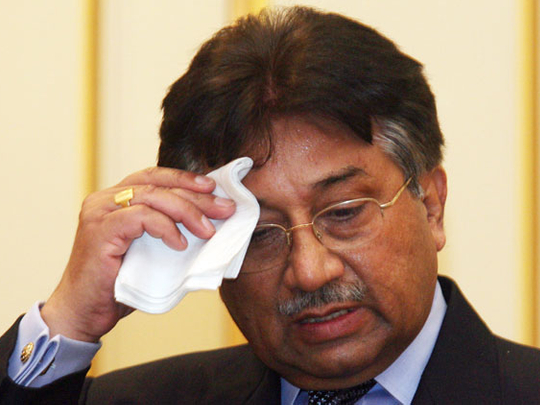
Islamabad: Pervez Musharraf, the first former chief of Pakistan’s army to face criminal charges, is today a far cry from the go-getting general who seized power in 1999.
A key US ally in the “war on terror”, he escaped at least three Al Qaida assassination attempts during his nine years in office.
But his life has lurched from one crisis to another since his disastrous return to Pakistan in March, ostensibly to run for election and “save” the country from militancy and economic ruin.
After four years of self-imposed exile, he was met not with a hero’s welcome but with apathy, ridicule, and a barrage of criminal cases.
The Taliban threatened to kill him, local media mocked his ambitions and his plan to return to power was dashed when he was disqualified from running in the May election, won by Nawaz Sharif — the man he deposed in 1999.
He has suffered the indignity of being confined to house arrest in his villa on the edge of Islamabad, cutting a lonely and powerless figure as the tangle of cases against him moved through the courts.
The Sharif government has said the 70-year-old should be tried for treason for seizing power and subverting the constitution.
He is wanted over the death of a Balochistan rebel leader during a military operation in 2006 and was charged Tuesday with the murder of opposition leader Benazir Bhutto, who died in a gun and bomb attack in 2007 after herself returning home from exile.
In his memoir In the Line of Fire, he quoted Napoleon and Richard Nixon as models for leadership, men both known for their tenacity — and whose hubris contributed to their downfalls.
Musharraf was born in Old Delhi on August 11, 1943, and his family moved to the newly created Pakistan shortly after independence four years later. He said he had his first brush with death falling out of a mango tree as a boy.
He joined the Pakistan Military Academy at age 18 and became a commando about five years later, rising through the ranks to reach the top when Sharif appointed him chief of staff in 1998.
As army chief, Musharraf orchestrated the brief, high-altitude “Kargil conflict” in Kashmir that almost took Pakistan to war with its nuclear rival India.
When he ousted Sharif in 1999 in a bloodless coup, many Pakistanis celebrated the end of a corrupt and economically disastrous administration.
Musharraf won a five-year term as president in a 2002 referendum, but reneged on promises to quit as army chief until late 2007.
He aligned with the United States after the September 11 attacks of 2001, earning international praise for trying to tackle Taliban and Al Qaida militants and for presiding over a period of record economic growth.
He faced no serious challenges until he tried to sack the chief justice in March 2007, sparking nationwide protests and months of turmoil that led to the imposition of a state of emergency.
After the December 2007 assassination of Bhutto, the national mood soured further and he was left isolated by the crushing losses suffered by his allies in February 2008 elections.
In August 2008, he finally resigned in the face of impeachment proceedings by the new governing coalition, going into exile until his ill-starred homecoming in March this year.












